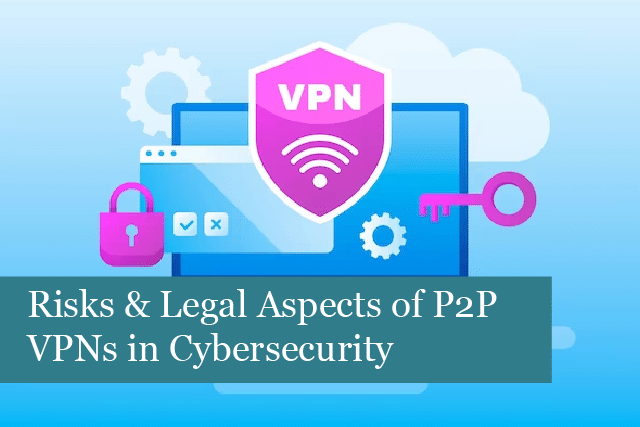
Peer-to-Peer (P2P) Virtual Private Networks (VPNs) have garnered attention for being decentralised, offering enhanced privacy and efficiency. Businesses require a secure, reliable means to connect employees globally and across diverse devices to their company’s networks and applications. However, the utilisation of VPNs carries inherent risks, especially when not designed and executed with due diligence, as they serve as a remote entry point into the network. Given the multitude of VPN products available, it becomes imperative to comprehend the legal and security implications associated with distinct types of VPNs and make an informed choice for your business.
Insights into Decentralised VPNs:
Understanding Peer-to-Peer VPNs
Peer-to-Peer VPNs distinguish themselves from traditional VPNs by establishing a network of user-operated nodes, where each participant functions both as a client and a server. This setup enables users to access and contribute resources within the network.
While this model appears efficient, it introduces considerable cybersecurity and legal concerns. The dual role of users as clients and servers makes it challenging to ensure the security of all network nodes. Moreover, employing P2P VPNs may potentially infringe laws pertaining to intellectual property, privacy, and data protection.
In essence, although P2P VPNs offer unique advantages, they concurrently present significant risks and challenges, demanding thoughtful consideration from users before adoption.
Risk Considerations for Host Computers
Engaging in a peer-to-peer (P2P) VPN transforms your device into a node within a broader network of interconnected devices. This decentralised network lacks a central server, with each device responsible for routing traffic to others. Despite the benefits such as heightened privacy, improved performance, and cost-effectiveness, P2P VPNs expose users to inherent security risks.
The decentralised nature of P2P VPNs complicates the implementation of robust security measures. Unlike conventional VPN services with dedicated security teams and centralised servers, P2P VPNs rely on collective efforts for security, making the entire network vulnerable if one device is compromised.
Another security risk lies in the increased susceptibility of each device to cyber threats, such as malware and hacking attempts. Becoming a node in a P2P VPN network heightens your device’s visibility to potential attackers, posing a risk to personal information.
To mitigate these risks, selecting a reputable P2P VPN provider with a proven track record in implementing stringent security measures is crucial. Additionally, maintaining up-to-date software, deploying strong passwords, and utilising encryption contribute to minimising security vulnerabilities.
Securing Your VPN against Cyber Threats
Security Measures and Patches
Regularly deploy software patches and security configurations to VPNs and remote devices.
Implement periodic workstation reboots to synchronise updates.
Increased Phishing Attacks
With the widespread shift to remote work, cyber actors intensify social engineering and phishing attacks.
Enforce device health checks, including updated endpoint protection and OS updates.
Alert employees to the heightened risk of phishing attacks.
Enhance device security by implementing Multi-Factor Authentication (MFA) on all VPN connections.
Limit access to essential files and systems.
IT Personnel Challenges
A restricted number of VPN connections may impact routine cybersecurity tasks for IT security personnel.
Ensure IT personnel are equipped to handle remote access cybersecurity responsibilities.
Opt for the strongest available device encryption.
Conduct VPN limitation tests to prepare for increased bandwidth requirements.
Disable local VPN network usage to prevent Split-Tunneling.
Legal Implications and Liability Issues
Engaging in a peer-to-peer (P2P) VPN involves sharing your IP address with other users, potentially exposing you to legal ramifications if one user conducts illegal activities using your IP address. This could lead to serious legal consequences and scrutiny. To mitigate these concerns, consider outsourcing your VPN to ensure proper implementation and security measures.
Bandwidth and ISP Limitations
P2P VPNs carry potential bandwidth and Internet Service Provider (ISP) limitations that can impact internet speeds and result in exceeding data caps, leading to additional charges or service interruptions. While P2P VPNs may offer anonymity, the associated risks and legal complexities warrant careful consideration. Opting for traditional VPN services with robust security measures and legal compliance often proves to be a more prudent choice to safeguard your digital activities.
What’s the Next Course of Action?
Decentralised VPNs, or P2P VPNs, promise heightened privacy but present security and legal risks. Users must grapple with cybersecurity concerns, potential legal scrutiny, and bandwidth limitations. To explore secure and well-configured VPN options, consider reaching out to Mansys for expert guidance on outsourcing your VPN needs.
Recommended Posts

Guidelines for Maintaining Optimal Productivity in Your IT System
27th October 2023

Are you making the most of your Microsoft 365 licensing?
4th July 2025

